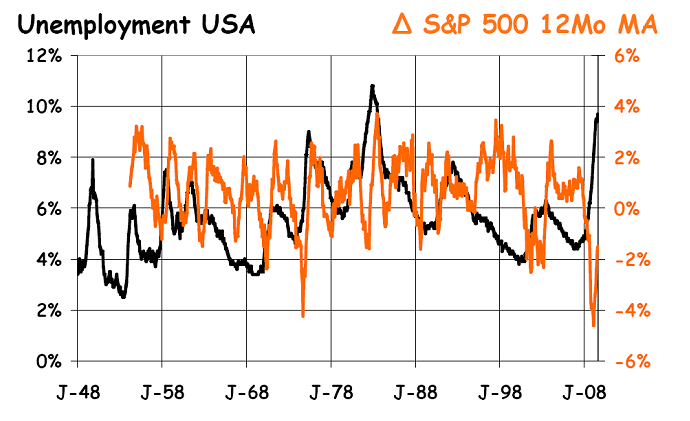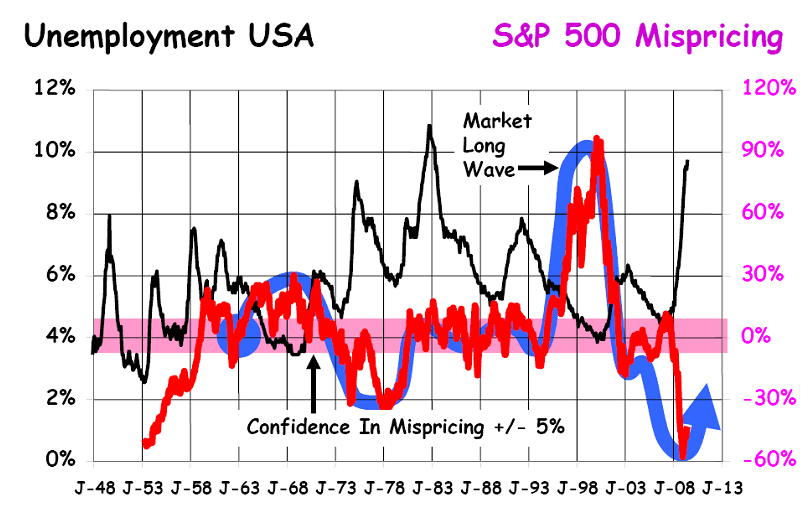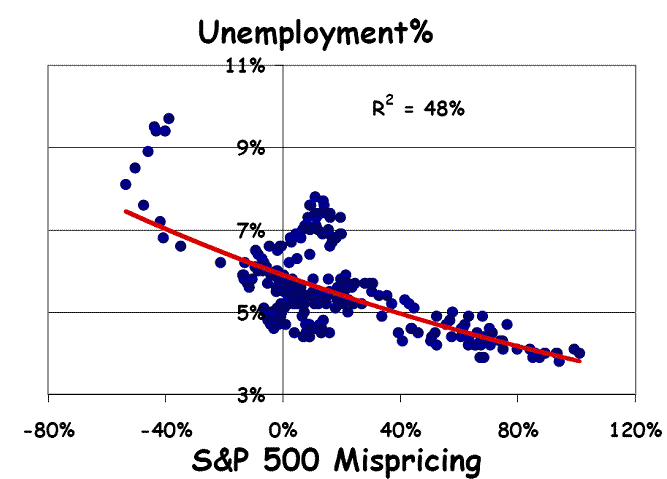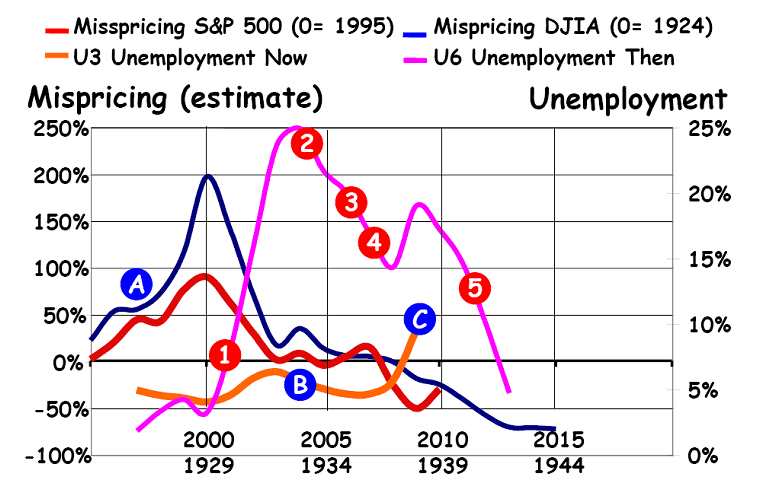Unemployment And Stock Markets, Next Good News Or Great Depression?
Stock-Markets / Economic Theory Sep 14, 2009 - 09:13 AM GMTBy: Andrew_Butter
 The implicit and sometimes explicit promise of government is they will do "useful" things, like control inflation (both up and down through the genius of Inflation Targeting), keep "The Motherland" safe from aliens, bail out banks, create jobs and if they can be bothered, do things like organize assistance to hurricane victims like they did after Katrina. That's why people pay taxes, and more important, that's why they vote.
The implicit and sometimes explicit promise of government is they will do "useful" things, like control inflation (both up and down through the genius of Inflation Targeting), keep "The Motherland" safe from aliens, bail out banks, create jobs and if they can be bothered, do things like organize assistance to hurricane victims like they did after Katrina. That's why people pay taxes, and more important, that's why they vote.
President Obama is allegedly going to create three million jobs in USA with his Stimulus Plan, that's $233,000 per job; apparently free-markets have failed so now it's up to Big Government and the re-invented-new-look planner-economists to step into the breach. Although sadly, so far, the rate at which jobs have been created appears to be rather slower than the rates at which they are being destroyed, but that's just detail.
There is also a notion that is gaining traction which is that unemployment is important for the stock market, and that's one (more) reason why the stock market is going to go down, because unemployment is going up so. If that happens, consumer spending will go down (bad for GDP and bad for earnings) and foreclosures will go up (bad for banks, so they won't lend, so companies cut back, consumption goes down, which means unemployment goes up...which takes you round into a feedback loop).
The logic now apparently is that the Stimulus Plan will create jobs, the so stock market will go up and America will be saved! Whoopee!! Why didn't I think of that?
This is the monthly change in unemployment in USA against monthly change in the S&P 500 since the end of the war (12 month moving average).

If you can see a pattern there, you have got a better imagination than I have. Plot one against another and the correlation is a big fat zero, did one more Great Economic theory hit the dust, or perhaps there is some cunning plan that mere mortals can't understand?
How about Market Mispricing?
That's the difference between what International Valuation Standards (IVS) calls "other than market value" and the price (http://www.marketoracle.co.uk/Article12114.html); it's not a new idea George Soros has been talking about that for years (Reflexivity), all IVS does is let you measure how big the difference is and in which direction.
The nice thing about mispricing is it's predictable. Proof of that pudding is that's how someone who never ever previously had any interest in the stock market, after doing a calculation on the back of an envelope, could say on 26th February that the S&P 500 would turn after 675 was pierced and then it would rally like crazy (it pierced 675 for about two hours on 6th March then it went up 55% over the next six months). (http://www.marketoracle.co.uk/Article9131.html).

In other words the big advantage of that particular theory is that it actually seems to work predicting something that was going to happen in the future (like the sun coming up in the morning), rather than elegantly explaining the past, well at least it did twice (675 and the rally).
Long term there isn't a great correlation either, but if you look from 1990 to now the correlation's not bad (45% to 90% depending on which period you chose):

That suggests some sort of relationship, although there are disconnects and there are possible reasons for that, but that's detail; big picture when mispricing goes down unemployment goes up, when mispricing goes up (i.e. in a bubble) unemployment goes down.
So (1) Does unemployment drive mispricing? (2) Does mispricing drive unemployment? Or (3) are they both driven by something else?
Three options:
1. Mispricing of the S&P 500 is driven by unemployment?
That's the latest theory apparently. Sadly there is nothing that logically connects mispricing with unemployment, rather the opposite. A bubble starts when there is an event, like a wave formed when a stone is thrown in a pond (like too much credit or liquidity, or an idea for a perpetual motion machine that everyone buys into), then the bubble bursts, and then the rest is completely predictable from the size of the preceding bubble (http://www.marketoracle.co.uk/Article12114.html)).
In other words you can predict mispricing today from something that happened seven to ten years ago, (that's how it was easy to know that the S&P 500 would turn after it hit 675).
So if unemployment influenced mispricing that would suggest that unemployment today affected something that happened seven years in the past? Either the notion of Time Travel is the foundation of the latest brilliant new theory from the genius planner-economists that are going to save the world (again), or that doesn't make sense. Take your pick!
2. Unemployment is driven by S&P 500 mispricing?
That sounds more plausible to me than traveling backwards through time. There is a logic in that too, when people can look up the "value" of their house or 401K, and say whoopee, then next thing there is a lot of money sloshing around and people are happy to pay other people to provide them with services that they actually can't afford, because in fact sadly they are not rich (unless they were smart or lucky enough to cash out in time).
On the flip side when they feel poor (having been introduced to the joys of negative equity and seen the value of their 401K halve), they are typically less inclined to spend their money on throw away toys (like electronic gizmos and SUV gas-guzzlers), that create no intrinsic economic value apart from for the people who made them; (that's called "re-distribution of wealth", in America's case it was from them to China and to the oil-exporting countries).
That's not absolute, that's relative, when the stock market is priced 90% too high (like in 2000) you can sell shares in a company for nearly twice what they are worth long term; that makes you them rich, and allows useless companies to raise more money than they know how to handle (so they buy executive jets to "improve efficiency").
When it's priced 45% too low (like in March 2009), that means that good companies can't raise any money even for good ideas, and if you sell your shares then you are selling at half the price of what you should be able to get for them long term, that makes you feel poor (or it ought to).
3.Both are driven by "The Economy"?
Doubtless the planner-economists will say that's it's all driven by "The Economy"; otherwise what useful function could they possibly serve to society if "The Economy" as "Managed" by them was not the answer to everyone's prayers?
There are some minor flaws in that argument, not least that planner-economists as a group have in the recent past (and perhaps also the more distant past, a notable example was USSR), been known to be completely and dangerously wrong; with depressing regularity.
And whilst planner-economists in partnership with politicians have clearly demonstrated that they have the ability to take a big fat spanner and throw it into the mechanism, so as to bust the machine of the market that sustained mankind before economists were even invented, they have yet to demonstrate that they know how to fix the machine after they helped break it.
The other rather obvious flaw is that the S&P 500 appears to be returning inexorably to the equilibrium line (pink line on chart). And that's in spite of "The Economy", which is now in shambles as are the "prospects", which are a shambles too.
Yet the S&P 500 appears to be following the path that was predicated by actions taken ten years ago (blue line on the chart), which might explain how come it's rally is such a mystery to the creators of the latest new bestseller "101 Reasons Why The Stock Market Rally Won't Sustain And Will Be A Massive Dead Cat Bounce" which was published on March 15th 2009.
So who is leading whom?
It looks suspiciously like the stock market might be leading the economy rather than the other way around, and perhaps it's not just Goldman Sachs gaming the system with the shiny new supercomputer that Uncle Sam bought them, and clearly it's not real estate moguls diversifying their portfolios, perhaps it's some of that nasty foreign money that America was much too precious to accept a couple of years ago?
And come to think of it, perhaps market mispricing drives unemployment too?
Does stock market mispricing drive unemployment?
If it does then since it appears to be relatively straightforward to predict where the stock market will go at this point of the "wave", presumably it would be possible to predict where unemployment is going to end up before it turns?
There is a sort of vague logic there, since the price of the stock market reflects the ability of companies to raise money so that real people, with real ideas, creativity, and capability can go out into the real world and create real jobs for themselves and for other real people.
Which is perhaps more sustainable long term than having planner-economists create wonderful feel-good ways to blow a couple of trillion dollars of taxpayer money (that it doesn't have) on "stimulating" shovel-ready ideas like building turtle underpasses and tagging sage grouse?
The logic only works of course if the planner-economists don't mess up the economy and the marketplace so badly that people who create jobs are forced to take their creativity and capability somewhere else and create jobs, real jobs for other real people elsewhere (http://www.marketoracle.co.uk/Article13213.html).
How about The Great Depression?
Some people are calling the current crisis the "Second Great Depression"; a few are saying ominously that it's worse.
There is a certain drama in that notion, although I notice that so far the soup kitchens on street corners to provide succor to starving Americans have been avoided, (that's "shovel ready" isn't it)? But then perhaps that's something to look forward to?
It's a rather tenuous comparison; (a) it was a long time ago (b) then USA was an industrial nation and an agricultural power-house with a current account surplus, (c) then the bubble was caused by credit on the stock market, (that time it was created by the Fed, this time it was the dream of Dot.com, followed by a housing bubble created by the $17 trillion of liquidity raised by the shadow banks through securitization).
If anything it's China that fits the bill for a massive bust if that analogy is used, very strong industrially, huge current account surplus, very "export driven" (as USA was in 1929). And rumor has it that the "government" is increasing liquidity so people can game the stock market...even better!
A better analogy might perhaps be Germany then (as USA now) and China now (as USA then). From 1923 to 1929 the major financial support for Germany was the country that it ran its largest current account deficit with - USA, just as China provides financial support to USA now, although it is considering re-considering that, just as USA cut Germany off in 1929. In that instance the "problem" was elegantly "solved" by Germany declaring war on the allies of it's erstwhile benefactor, which eventually ended up in USA and Germany being at war, which solved the unemployment problem at a stroke.
Apply that analogy to the current situation and that suggests that the "solution" will be found when USA declares war on North Korea (and Iran?), and China then gets sucked in. That is perhaps the most logical and credible outcome of any of the elements of that analogy, which is presumably something else to look forwards to, this is starting to get exciting!
There is also a debate about whether the figures for unemployment then are comparable with the figures now, on one hand then they measured U6, now they report U3, although in those days "Missy" used to stay at home and cook and clean, now she works (if she can find a job).
The other thing is that unemployment in the 1930's was caused by planner-economists in partnership with politicians deliberately throwing spanners into the works, for example (1) the 1930 Smoot-Hawley Tariff Bill which destroyed Americas export markets, (2) the 1933 National Industrial Recovery Act which was designed to destroy jobs, and (3) the 1935 Wagner Act, also designed to destroy jobs. The coup de grace (4) was the 1936 Undistributed Profits Tax, which was designed to destroy the Stock Market.
As an exercise in demonstrating how effective planner-economists in partnership with politicians can be at destroying markets and economies, that was perhaps their finest hour. I'm still uncertain to what extent the current administration is set on "topping" the performance of their venerable predecessors from the past?
The really big debate as far as I am concerned is where exactly is USA now in that analogy. Looking at the mispricing chart, it looks like 1929 in the analogy was 2000 in the latest bubble.
- 1929 was a bubble caused by speculation (fuelled by credit); 2000 was a bubble fuelled mainly by a belief in the idea that the Internet would create perpetual motion machines.
- What happened next in both cases was predicated by what the government did. It is generally thought that after 1929 the government made a hash of things, this led to more bank failures than were necessary (apparently), and very high unemployment.
- What happened following the popping of the 2000 bubble which was shortly followed by 9/11, was that Chairman Greenspan slashed interest rates which (a) helped re-inflate the economy so jobs were not lost in great numbers (b) helped inflate house prices into a bubble to dwarf all house-price bubbles (although securitization helped even more), a sort of passing through if the bad apples of the Dot.com, and now all those bad apples got passed on to the long suffering US taxpayer. Sort of "pass the rotten apple" economics.
Similar story but not exactly the same play book; this is how it looks anyway

That's a bit of a cat's cradle, so I've put numbers on the lines. As far as interesting points go:
1: There is a striking similarity between the shape of the mispricing curve of the stock market for 1929 and now if you line up 1929 with 2000 (the peak of the Dot. com). That does seem to suggest that regardless of what governments and planner-economist do or don't do, that won't actually affect the inevitability of the market long wave.
Of course the "101 Reasons Why The Stock Market Will Crash Soon" brigade say that "No, that's wrong, 2008 was the equivalent of 1929". The logic for that is unfortunately about as clear to me as an Ink Blot Test, but I suppose if it's explained in words of one syllable (twice) I might understand it.
But the explanation would need to explain (a) why the "other" idea (1929 = 2000), predicted that the S&P 500 would bottom at 675 and (b) why the "all knowing" brigade did not predict that (before it happened and no vague comments like, "it's a good idea to put on your shorts before the tide goes out", doesn't hack it).
Any offers?
2: Notice the "Soros-Blip" (point (A)).
3: It would appear that the much maligned Chairman Greenspan might have actually done one thing right and "saved America" from the damage of the fall-out from the Dot.com plus the effects of 9/11, and that was why there was not a burst of unemployment afterwards like there was after 1929 (Point B).
I remember at the time he was hailed as a genius (he is of course very modest about his achievements in his "book" (The Age of Turbulence) although he can't resist a few covert self inflicted pats on the back).
In those days the idea of "Inflation Targeting" and the light touch of the Fed as the Captain of the destiny of the world was accepted wisdom, and people used to queue for hours to hear snippets of the words of wisdom (and try and figure out what they meant).
Except that he didn't notice that he helped create a housing bubble (although the mistake there was more not noticing the $17 trillion of liquidity that the shadow banks were relentlessly pumping into the economy (http://www.marketoracle.co.uk/Article12864.html)).
So in effect all the lousy investments in the Dot.com got transferred to lousy investments in the housing market, and then the people who financed that went bust so now that mistake is coming home to roost. Like the captain of the Titanic, relentlessly plowing into an iceberg (and increasing the speed just before impact).
If you buy that story and the idea that somehow the events of 1929 to 1939 are being repeated, unemployment should be peaking about now (Point C), that's the good news.
There again, extrapolating something from seventy years ago is a bit of a stretch, particularly since there is not a lot of "like for like". But if you buy that story then I suppose the really good news for unemployment is that if the analogy is carried to it's logical conclusion in five years time USA will be at war with China which will be fantastic for unemployment!!
"Bring it on"! That's what I say!!
Or Perhaps one can take an analogy too far?
Another way to look at that is to analyze the disconnects on the relationship between unemployment and mispricing, that's a real cat's-cradle.
Take it from me, I looked, that seems to suggest that unemployment (U3 as reported these days by the Bureau of Labor) will peak at about 13 %, probably in the next six to nine months, that's if (a) you believe that stock market mispricing drives employment or unemployment (b) you don't believe in time travel (c) you don't believe that Big Government and planner-economists can fix the mess they created, and in fact all that's happening is that left to their own devices, markets heal in spite of all the good intentions.
Of course one thing that would really create a lot of jobs (apart from going to war with China) would be to create another bubble somehow! Now that's a thought, perhaps they should create a "Department of Bubble"? That of course is much too important a task to be given to the Fed.
Lessons Learned?
1: Bubbles create jobs but those jobs are "artificial" and in the end they destroy more jobs than they create.
2: Safer not to play with a fire you don't understand, markets existed before government and planner-economists, and they will exist after.
My Opinion:
Unemployment in USA today, and where it will peak, has got (and will have) hardly anything directly to do with anything the government does now, it is a direct and predictable result of mistakes made over the past ten years or so.
A prudent government might be well advised to be thinking about the effect that the mistakes they make today will have in ten years time (or considering the amount of debt they are piling on for some poor sucker-taxpayers to pay in the future, twenty years on).
By that token with regard to the present, rather than try and create artificial jobs and "raise dust", governments should focus more on not making blundering errors rather than proactively "saving the world". One thing that does appear to be clear from history is that there are a lot more examples of governments or their agents doing something REALLY stupid, and causing havoc, than there are examples of them doing anything that was moderately smart and making things better.
In other words, best to keep out of the way and simply provide the infrastructure and the correct environment (including sensible coherent regulation to prevent potential suicide bombers blowing up the system like the shadow banks did (http://www.marketoracle.co.uk/Article12864.html), and letting the medical profession run a monopoly to bleed the country dry (http://www.marketoracle.co.uk/Article13041.html)), and wait for the economy and free-markets to heal themselves.
Patience is a virtue and virtue is a Grace! And Grace is a little girl who didn't try and mess with things she didn't understand.
Other than that, simply do what it can to alleviate the suffering of the victims of yesterdays failed policies, just as the correct response to Katrina would have been to bring water, shelter and medical assistance, quickly. That's supposed to be why people pay taxes.
On that note perhaps they should concentrate on figuring out how to do something like that with a modicum of competency, before trying anything more complicated? There was an analogy brought up the other day about putting a chimpanzee in the control room of a nuclear power station.
Somehow I would feel more comfortable if the "Vision" was something more along the lines of "don't touch anything!"
By Andrew Butter
Andrew Butter is managing partner of ABMC, an investment advisory firm, based in Dubai ( hbutter@eim.ae ), that he setup in 1999, and is has been involved advising on large scale real estate investments, mainly in Dubai.
© 2009 Copyright Andrew Butter- All Rights Reserved
Disclaimer: The above is a matter of opinion provided for general information purposes only and is not intended as investment advice. Information and analysis above are derived from sources and utilising methods believed to be reliable, but we cannot accept responsibility for any losses you may incur as a result of this analysis. Individuals should consult with their personal financial advisors.
Andrew Butter Archive |
© 2005-2022 http://www.MarketOracle.co.uk - The Market Oracle is a FREE Daily Financial Markets Analysis & Forecasting online publication.



